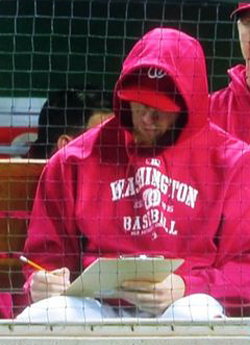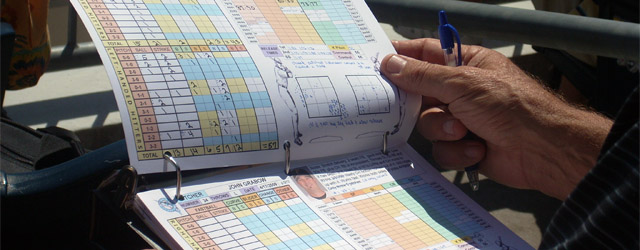
It’s now Day 19 of the 21 Day Challenge. Only two more days until we reach the end. Today’s task is to scout your opponents.
Scouting does not always have to take place while you are sitting in the stands. You don’t necessarily have to travel to another ballpark just to watch two other teams play and take notes about players you watch. In fact, you can scout your opponent right from the dugout while you are competing against them during a game.
As I’ve said before, baseball is a game that allows for lots of discussion and breakdown of strategies, on field play, and fundamentals. There are brief bouts of action followed by long moments of non-action. Instead of debating sunflower seed flavors in the dugout and looking for girls in the stands, break out a notebook and start taking notes on your opponents. Keep track of how and when they perform, and soon enough you will have compiled a nice little tendency chart of their game and abilities.
What does this mean for you?
- For pitchers, you’ll know if a particular hitter hits fastballs or off-speed pitches better. Does he handle the inside pitch well or can you get him swinging on a hard four seamer up in the zone? In other words, you’ll know the hitter’s strengths and weaknesses and can use those against him next time he is standing 60 feet 6 inches away from you.
- For hitters, it’s the same premise. You can see if a pitcher likes to throw a certain pitch in a certain count. Is he predictable? Can you crowd the plate because he’s afraid to throw inside? Imagine if you knew the pitcher’s tendencies so well that you could predict what pitch he was going to throw you. That’s a big advantage in your favor.
All of this information you gather during the course of a game or season can add up to valuable information should you face the same opponent later in the season or even come playoff time. Every little bit helps.
Pay Attention to the Game
You don’t always have to be in the dugout either to take notes. I played with one teammate that would make notes between innings. As a position player, when he was not in the batter’s box he would chart an opposing pitcher’s pitch type, record ball or strike, and whether or not the ball was put in play. Again, to see if the pitcher fell into any patterns. After coming in from the field during half innings, he would grab his notepad and record the opposing hitters results so he could make a defensive adjustment the next time through the lineup. Did he have to do these things? No, but doing so made him better prepared when he took the field. And the player who is better prepared often has an advantage over his counterparts.
Next time you head to the field for a ballgame, take a pen and notebook with you. Start watching the game with purpose. Don’t just be a casual spectator. If you are an underclassman, chances are you will have many more games against the same players and teams. Learn how they play and what their strengths and weaknesses are. Then, study your notes and charts and be prepared for the next time you step across the foul line to take the field.

Leave a Reply